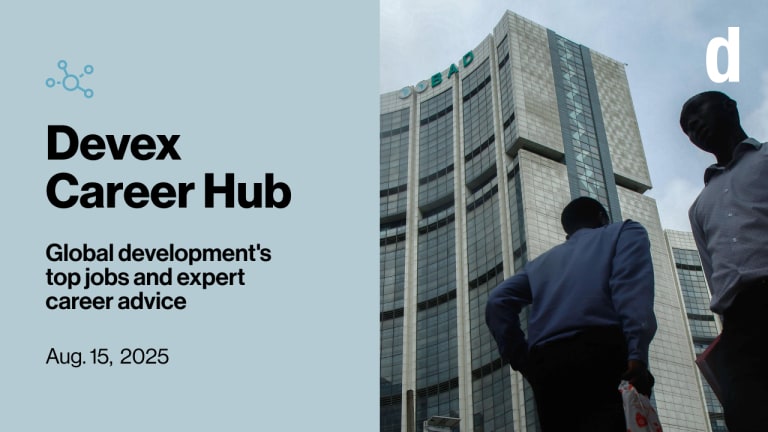Portfolio careers in development: What to know and how to get started
During a recent digital careers event, coach Kelsi Kriitmaa offered guidance to development professionals on how to navigate a portfolio career.
As the development sector weathers funding cuts, hiring freezes, and deep organizational shifts, some professionals are rethinking what a meaningful and sustainable career might look like moving forward. “What better time to start diversifying our career path than now if we haven't done so already,” Kelsi Kriitmaa, a leadership and executive coach who has worked across humanitarian, United Nations, and philanthropic sectors, said during a recent Devex digital careers event on how to navigate a portfolio career path. “A portfolio career is essentially multiple income streams and identities,” she said. These may include consulting, fractional or short-term work, advisory positions, and board roles across a range of areas, such as teaching, facilitation, or content creation, for example. But what differentiates a portfolio career from a temporary period of freelance work? In part, a mindset shift. Instead of being “between things, you are a business, and this is a real job,” she said. To help those who are either curious about what a portfolio career might look like for them, ready to fully make this transition, or somewhere in between, here are a few key takeaways from the event. Portfolio career pros and cons The potential benefits of a portfolio career are plentiful, and include autonomy, alignment with your values, and the ability to pick the projects and the organizations that you really want to work for and with, Kriitmaa said. Working for multiple organizations also means you’re not overdependent on one income stream — an issue many in the sector have had to contend with this year. “This is an opportunity to diversify your organizations and your experience, and that also means diversifying your revenue, so when there is instability or volatility in the sector, you have more options,” she said. On the flip side, having a variety of income streams can be problematic as well. “You can be incredible at planning, and there can still be huge problems in your pipeline and issues with your clients,” she said. Portfolio careers come with feast or famine work cycles, and there is always the threat of unpaid invoices. There are also a host of administrative and technical aspects related to being your own boss that add to your overall workload. These include determining the legal structure of your company, meeting income tax requirements, and managing operational costs. Claiming your niche An essential aspect of a successful portfolio career is having a firm grasp of the problem you solve and for whom. “A way to think about this is, what do people already come to you for [or] what issue or approach do you want to be associated with?” Kriitma said. This will help to establish your UVP, or unique value proposition, which is important for any sustainable business, “because if you're known for everything, somebody's probably not going to come to you for the thing they need,” she said. However, focusing your efforts doesn’t mean limiting yourself to only the kinds of work you’ve done professionally in the past. “Maybe that you are an M&E adviser at an NGO, but in your spare time, you love to do writing and copy editing. So are you going to build your portfolio career just on M&E? Probably not, and this is where we get to be flexible,” Kriitma said. Ideally, you want to do the kind of work that “lights you up, but also has market demand,” while understanding that “not every portfolio within this career is going to be the same remuneration, the same level of joy, or the same time commitment,” she said. Establishing and refining your services Once your niche and UVP are clear, Kriitma recommended defining one or two core offerings that solve real problems and meet your income needs. “Try to get an anchor client and start with that before building out other aspects that might be more fun in your portfolio career,” she said. Rather than estimating how much income you might need to bring in, calculate your MVP, or minimum viable pay, which can cover monthly expenses that might include your mortgage, groceries, and child care payments. It’s also important to block off time on your calendar for things such as professional development and marketing efforts, while keeping in mind family and other personal commitments. “Just because you can do it all doesn't mean you should be doing it all, and this is where you need to refine your services, vis-à-vis your time, your energy, and your income needs,” she said. Ready to stand out from the crowd and get noticed by the recruiters who matter most? Update your Devex profile and start connecting with top global development recruiters now.
As the development sector weathers funding cuts, hiring freezes, and deep organizational shifts, some professionals are rethinking what a meaningful and sustainable career might look like moving forward.
“What better time to start diversifying our career path than now if we haven't done so already,” Kelsi Kriitmaa, a leadership and executive coach who has worked across humanitarian, United Nations, and philanthropic sectors, said during a recent Devex digital careers event on how to navigate a portfolio career path.
“A portfolio career is essentially multiple income streams and identities,” she said. These may include consulting, fractional or short-term work, advisory positions, and board roles across a range of areas, such as teaching, facilitation, or content creation, for example.
This article is exclusively for Career Account members.
Unlock this article now with a 15-day free trial of a Devex Career Account. With a Career Account subscription you will get:
- Full access to our jobs board, including over 1,000 exclusive jobs
- Your Devex profile highlighted in recruiter search results
- Connections to recruiters and industry experts through online and live Devex events
Start my 15-day free trialAlready a user?
Printing articles to share with others is a breach of our terms and conditions and copyright policy. Please use the sharing options on the left side of the article. Devex Pro members may share up to 10 articles per month using the Pro share tool ( ).
Justin is a contributing writer and editor who previously led Devex’s careers content strategy. Before joining Devex, Justin served as the managing editor of Springwise, covering sustainable and climate-tech innovation across all business sectors. He also spent over 13 years as an editor and writer for the New York Times, specializing in digital content production and strategy while producing written and multimedia content on a range of topics, including travel, sports, and technology.








